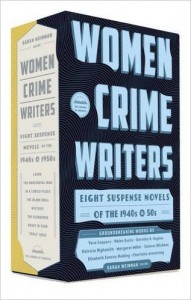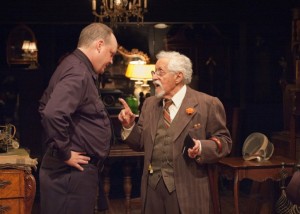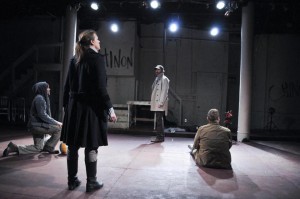 I reviewed Women Crime Writers: Eight Suspense Novels of the 1940s and 1950s, edited by Sarah Weinman, in Saturday’s Wall Street Journal. Here’s an excerpt.
I reviewed Women Crime Writers: Eight Suspense Novels of the 1940s and 1950s, edited by Sarah Weinman, in Saturday’s Wall Street Journal. Here’s an excerpt.
* * *
The Library of America, which specialized once upon a time in reprinting what its dust jackets continue to describe as “America’s best and most significant writing,” has long since succumbed to mission creep. These days it’s as likely to publish Kurt Vonnegut as Edith Wharton, and a fast-growing chunk of its catalog consists of mystery novels and other crime fiction by writers both familiar (Dashiell Hammett) and obscure ( David Goodis). Now comes “Women Crime Writers,” a two-volume anthology edited by Sarah Weinman, a respected critic of the sanguinary genre, that contains eight novels by seven obscure authors and a ringer, Patricia Highsmith, who is still widely remembered for having written “Strangers on a Train” and created Tom Ripley, the sociopath you love to hate,
So are these novels good, significant, neither, or both?
The fact that they were written by women is of no great consequence in and of itself. Women have been writing successful crime novels since the 19th century. Indeed, most of the books in “Women Crime Writers” were popular when they first came out, and Vera Caspary’s “Laura” (1943), Dorothy B. Hughes’s “In a Lonely Place” (1947), Elisabeth Sanxay Holding’s “The Blank Wall” (1947, filmed as “The Reckless Moment”), and Charlotte Armstrong’s “Mischief” (1950, filmed as “Don’t Bother to Knock”) were later turned into movies that starred such A-list actors as Humphrey Bogart, James Mason, Marilyn Monroe and Gene Tierney. Yet none of them, not even Highsmith’s “The Blunderer” (1954), managed to make posterity’s cut. What, then, makes them worthy of revival now?
The answer is that they are all exceptionally fine, as much so as any of the crime novels written by men that were published in this country in the 1940s and 1950s. In particular, I wouldn’t hesitate to stack “The Blunderer,” “In a Lonely Place” and Margaret Millar’s “Beast in View” (1955) up against the best work of Raymond Chandler and Ross Macdonald (who was Millar’s husband), both of whom have already been declared significant by the Library of America.
But the other books in “Women Crime Writers,” very much including Helen Eustis’s “The Horizontal Man” (1946) and Dolores Hitchens’s “Fool’s Gold” (1958), are closely comparable in quality to their companions: Each of them is smartly plotted, tautly written, sharply characterized and not at all dated….
* * *
Read the whole thing here.
The opening sequence of The Reckless Moment, Max Ophüls’ 1949 film version of Elisabeth Sanxay Holding’s The Blank Wall, starring Joan Bennett and James Mason:



 Part of what makes “The Price” so good is that Miller somehow managed to steer clear of the bloviatory sermonizing of his other plays, “Salesman” in particular. He claimed long after the fact that it was really an allegory of America’s involvement in Vietnam, but if so, he covered his symbolic tracks so carefully that it’s hard to see what he meant. Far from being obviously political, “The Price” is a life study of the power of unacknowledged pride to corrode family ties, and though the last 15 minutes are a bit stagy, that doesn’t make them any less riveting.
Part of what makes “The Price” so good is that Miller somehow managed to steer clear of the bloviatory sermonizing of his other plays, “Salesman” in particular. He claimed long after the fact that it was really an allegory of America’s involvement in Vietnam, but if so, he covered his symbolic tracks so carefully that it’s hard to see what he meant. Far from being obviously political, “The Price” is a life study of the power of unacknowledged pride to corrode family ties, and though the last 15 minutes are a bit stagy, that doesn’t make them any less riveting. Today Bedlam is a major name in New York theater, as well as a sign of the times. Our cash-strapped drama companies have been increasingly disinclined in recent years to revive budget-busting big-cast plays like “Saint Joan.” I first took note of that tendency in this space in 2013, and it’s grown even more pronounced since then. To be sure, Broadway does exhume big-cast classics on occasion: “A Streetcar Named Desire,” for example, has been done there nine times, most recently in 2012. But the only plays of that kind that get done with any regularity nowadays, whether in New York or by regional companies, are such well-worn single-set chestnuts as “Streetcar,” “Death of a Salesman,” “Our Town” and “You Can’t Take It With You.” Fine plays all—but there’s more to large-scale theater than familiar staples.
Today Bedlam is a major name in New York theater, as well as a sign of the times. Our cash-strapped drama companies have been increasingly disinclined in recent years to revive budget-busting big-cast plays like “Saint Joan.” I first took note of that tendency in this space in 2013, and it’s grown even more pronounced since then. To be sure, Broadway does exhume big-cast classics on occasion: “A Streetcar Named Desire,” for example, has been done there nine times, most recently in 2012. But the only plays of that kind that get done with any regularity nowadays, whether in New York or by regional companies, are such well-worn single-set chestnuts as “Streetcar,” “Death of a Salesman,” “Our Town” and “You Can’t Take It With You.” Fine plays all—but there’s more to large-scale theater than familiar staples. IN ASHLAND, OREGON:
IN ASHLAND, OREGON: